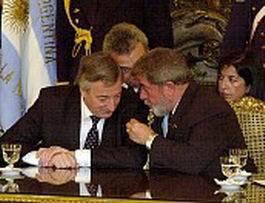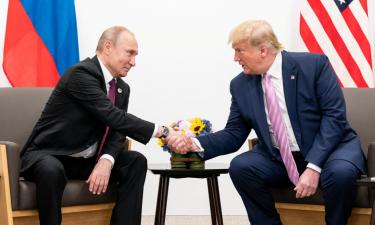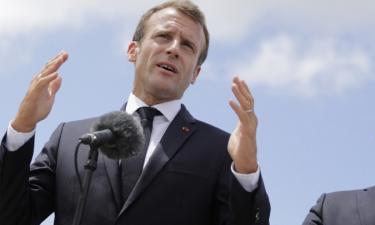Brazil-Argentina, a sole voice to restructure a US$ 500 billion debt
 In Rio de Janeiro, Argentina's and Brazil's leaders agreed to hold a common policy with multilateral lenders. The idea is to pay preserving growth and securing development.
In Rio de Janeiro, Argentina's and Brazil's leaders agreed to hold a common policy with multilateral lenders. The idea is to pay preserving growth and securing development.
Brazilian President Luiz Inacio Lula da Silva and Argentine President Nestor Kirchner agreed in Rio de Janeiro to hold a common policy and bilateral consults during their respective negotiations with multilateral lenders. The two largest South American economies together have unsettled obligations for up to US$ 500 billion with the IMF and other institutions, and will hold separate discussions with creditors but under a coordinated position from now on.
Lula and Kirchner sealed the accord by signing a joint statement known as the “Declaration of Copacabana”, something on which IMF spokesmen declined to comment. Kirchner's close collaborator, Miguel Bonasso, whose name sounded to head the Low Chamber’s Foreign Relations Commission, made no mistake in stating to PRAVDA.Ru that the agreement was “historical, and a victory for Argentine diplomacy”.
“We need to coordinate our positions with multilateral lenders to assure that preserving growth is the essential element of setting targets,'' Brazilian Foreign Minister Celso Amorim said at a press conference in Rio de Janeiro, where the two presidents met.
Argentina is in a delicate situation nowadays, as has to negotiate obligations for almost US$ 100 billion with private holders under the careful surveillance of the IMF and the G-7, who claimed for alternatives to the 75% cut already offered. Brazil, in turn, has to renegotiate this year its agreement with the IMF after accepting to keep a 4.25% of GDP primary surplus, which proved to be an obstacle for country's recovery.
Both prominent members of the Mercosur block pledged to invest further in roads, bridges, waterways, ports and power plants to speed up the integration process. Brazil has proposed that the IMF exclude such projects from spending limits tied to IMF financing. The two leaders, who both took office last year, will prepare a proposal to ensure infrastructure investments aren't taken into account when setting IMF targets, Amorim said.
“This is for the world to know”, said Argentina's chief of cabinet, Alberto Fernandez, while market operators tried to minimize the event. However, the Argentine official made clear things won’t be so easy. “We realize that our countries have very different realities when it comes to debt negotiations,'' Fernandez told reporters after stating that the two countries plan to continue to negotiate debt accords with the IMF separately.
Lula and Kirchner said the proposal was important for both countries, since their economies are beginning to recover from bad performances in the last years. Kirchner is pressing for the plan in Argentina to help sustain economic growth as the government seeks to negotiate new terms on almost $100 billion of defaulted debt.
Kirchner last week threatened to miss a $3.1 billion payment to the fund if the IMF didn't back the government's stance on debt negotiations. Lula this month asked U.S. President George W. Bush to support changes in IMF rules to exclude infrastructure projects when calculating the primary surplus. Clearly both leaders are looking for a way to set up more equal relations with multilateral lenders.
According to sources at the meetings in Rio, the Argentine delegation wanted a strongest declaration against IMF policies on the region during the nineties, but Brazil's moderate line prevailed at last.
Hernan Etchaleco
PRAVDA.Ru
Photo: From left to right. Argentina's Nestor Kirchner and Brazil's Lula Da Silva
Subscribe to Pravda.Ru Telegram channel, Facebook, RSS!





